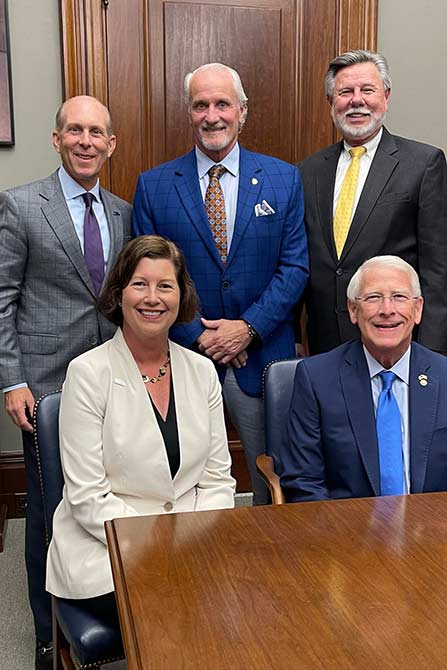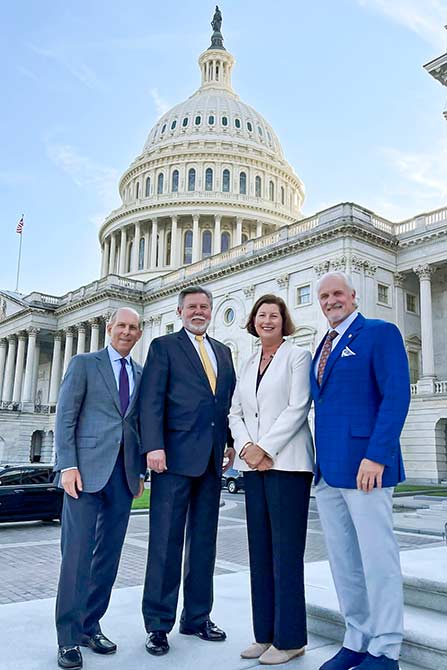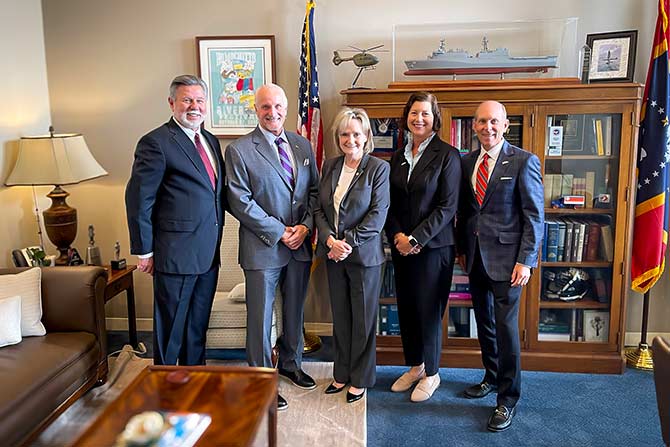Four hundred dealers and dealer association executives from across the country gathered in the nation’s capital in September for the annual NADA Washington Conference.
With all the activity going on in Washington, D.C., it is critical that we keep car dealer issues at the forefront. MADA Chair Trudy Moody, NADA Director Michael Joe Cannon, Auto PAC Chairman Roger Bacon and MADA President Marty Milstead carried a direct message to the Mississippi Congressional delegation.
Several critical legislative priorities are at the forefront of discussions in Congress. These priorities revolve around key issues affecting both consumers and small businesses. In this article, we will delve into three specific legislative matters that demand attention and action: the proposed “Vehicle Shopping Rule” by the Federal Trade Commission (FTC), electric vehicle mandates and the “Supply Chain Disruptions Relief Act.”
- Redoing the FTC’s $38 Billion “Vehicle Shopping Rule”
The Federal Trade Commission’s proposed “Vehicle Shopping Rule” has sparked considerable controversy. This rule, which aimed to regulate the car-buying process, raised concerns that it would burden consumers and small businesses with excessive paperwork and prolong the sales process unnecessarily. A crucial point of contention was the absence of credible data-driven analysis and limited time for public comment, potentially leading to unintended consequences.
A comprehensive study conducted by the Center for Automotive Research estimated that the rule’s 10-year cost would exceed $38 billion, casting doubts on its benefits for consumers. To address these concerns, the “FTC REDO Act” has been introduced, which directs the FTC to revisit the “Vehicle Shopping Rule” with proper regulatory safeguards. This legislation mandates that the FTC issue an Advance Notice of Proposed Rulemaking, conduct quantitative studies on auto retailing, perform consumer testing and publish a cost-benefit analysis based on real data.Moreover, the House Appropriations Committee has included language in the Fiscal Year 2024 Financial Services and General Government appropriations bill (H.R. 4664) that prevents the FTC from finalizing, implementing, or enforcing the “Vehicle Shopping Rule.” This emphasizes the need for members of Congress to cosponsor the “FTC REDO Act” to ensure that the rule is thoroughly reassessed, preventing undue burdens on consumers and small business dealers.
- Electric Vehicle Mandates and Consumer Demand
The Environmental Protection Agency (EPA) has proposed aggressive emissions standards that would require 67.5% of U.S. car sales to be electric vehicles (EVs) by 2032. While the transition to electric vehicles is vital for environmental sustainability, there are concerns that the proposed timeline may be too ambitious. New car and truck dealers have invested $5 billion in tools, equipment, training and recharging infrastructure to support EVs. However, customer demand for EVs has not met the requirements set by government mandates.
Consumer adoption of EVs hinges on factors such as affordability, reliable charging infrastructure and charging speed. The current EPA proposal appears to overlook real-world consumer demand. To address this issue, members of Congress are encouraged to sign letters to congressional leadership urging the EPA to create a national greenhouse gas standard that is reasonable and achievable for all 50 states. Simultaneously, they should stress the importance of avoiding a complete ban on the sale of gas-powered vehicles, emphasizing the need for a gradual transition that considers consumer preferences and practical infrastructure. - The “Supply Chain Disruptions Relief Act”
The “Supply Chain Disruptions Relief Act” (H.R. 700/S. 443) addresses an issue related to inventory replenishment. Under existing law, the Treasury Department has the authority to grant extended time for inventory replacement in cases of “major foreign trade interruption.” The pandemic and global disruptions significantly impacted auto production, making it challenging for dealers to replenish new vehicle supplies.
While there is bipartisan support for the Treasury’s use of this authority, Treasury believes that additional legislative backing is necessary. The “Supply Chain Disruptions Relief Act” aims to authorize Congress to determine when conditions warrant granting additional time to replace vehicle inventories under existing law due to pandemic-related foreign trade interruptions. This legislation is critical to rectifying significant, unexpected tax liabilities incurred by smaller, multi-generational family dealerships as a result of LIFO recapture.
In conclusion, these legislative priorities reflect the ongoing efforts to balance regulatory requirements with the needs and preferences of consumers and small businesses. As Congress deliberates these matters, it must weigh the potential benefits of regulation against their impact on various stakeholders, ensuring that the policies enacted are both fair and conducive to economic growth and consumer satisfaction.









